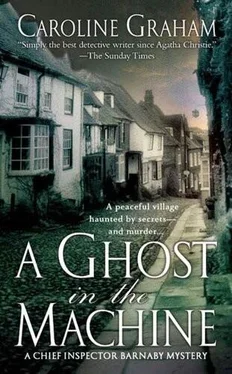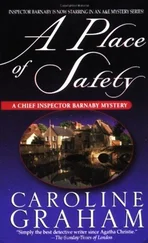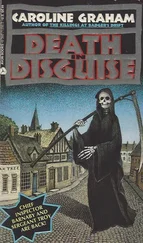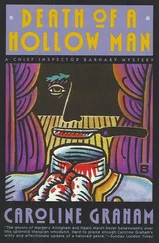Sergeant Troy took a deep breath of carbon monoxide from the queue of cars at the traffic lights. It was deeply refreshing after being shut in the Allibones’ sitting room for nearly an hour. The acrid smell of chrysanths mingling with the knockout perfume from a bowl of fruit so ripe it had practically liquified had made him feel quite queasy. Then, as they reached the sleeping dog at the foot of the stairs, Neptune’s bottom had backfired. This strenuous, intensely sulphurous explosion was so powerful it all but bowled them into the High Street. Here Troy started to complain that Alicia’s date and toffee flapjack (which she had called “marchpane”), now firmly glued to the roof of his mouth, had been far too sweet.
“Didn’t stop you packing it in,” grumbled Barnaby. His envy when observing his sergeant’s constant guzzling of highly calorific food was matched only by his resentment as Troy continued never to gain an ounce. Joyce had tried to cheer her husband up by saying that Gavin was cruising for a bruising by which she meant an unheralded heart attack or stroke. But though Barnaby had waited patiently for now almost fourteen years, neither had yet had the decency to show themselves.
When they reached the car he said, “Check out the Magpie, would you? See if anyone remembers seeing Brinkley or the Lexus around here the night before he died.”
“Shouldn’t I do that later – when we’ve got a piccy?”
“We’re on the spot. It’s worth a try.” Barnaby picked up his car phone, dialled the incident room and got DS Brierly.
“Audrey, can you get someone out to Cox’s MiniCabs? A fare, a young woman, was dropped outside the NatWest bank around ten p.m. Monday, the twenty-third of last month…That’s right. Dig up what you can.”
Some minutes later Sergeant Troy returned, positively burnished with satisfaction. He climbed into the car, beaming. “Got a result, Guv.”
“Could have fooled me.”
“Talked to the barman. Same guy who was on that Monday night. He says Brinkley came in, ordered a drink, then sat by the window, hiding behind a paper, at the same time keeping an eye on the street. This bloke asked him if he was doing a spot of surveillance and Brinkley tipped him the wink and gave him ten quid to keep shtum.”
“How did the barman know who it was?”
“He didn’t then. But there was a photo in the Echo the day after the inquest. If Brinkley was expecting the girl Allibone spotted,” continued Sergeant Troy, “she could have been a legitimate client.”
“Some client,” murmured Barnaby, “with the keys to the office in her pocket.”
When the two policemen visited Brinkley and Latham for the second time Gail Fuller, leading them into the main section, whispered over her shoulder, “We’ve got the full complement today.” Then, jerking her head in the direction of the rear cubbyhole: “Put the flags out.”
Barnaby, looking, saw Andrew Latham looking right back. He got up and, before Leo Fortune had even had time to greet the two policemen, contrived to join them, explaining that as the firm’s senior partner he felt he should be present.
Leo said sharply, “This might be personal, for all you know.”
“But it isn’t, is it, Chief Inspector?”
“We’re here to continue our inquiries into Mr. Brinkley’s death.”
“Get on with it then,” said Latham. “Time’s money.”
Fortune gave an ironic laugh then, having started, couldn’t stop. Finally he managed to say, “Sorry about that. Are you telling us things today, Chief Inspector? Or asking us things?”
“Bit of both really, sir. What can you tell me about this business of the lights going on after—”
“Oh, no!” cried Latham, making a dramatic gesture of cowering horror. “Not the lights!”
“Please, Mr. Latham. If you’ve anything to contribute just tell us. We don’t have time to mess about.”
“A few weeks ago that nosy old scroat over the road told Brinkley what presumably he’s been telling you. And instead of telling him to mind his own business Dennis started worrying himself silly. He even had the cheek to ask if I knew anything about it.”
“And did you, sir?” asked Sergeant Troy.
“I was getting rat-arsed at a Lions Club dinner the first time it was supposed to have happened.”
“And the second?” enquired Barnaby.
“At the theatre. Mamma Mia. ”
“That good, was it?”
“And before you ask,” continued Latham, “there were three witnesses—”
“But those were just the occasions Allibone noticed,” interrupted Leo. “We don’t know about the ones he missed.”
Barnaby, remembering the glasses, thought he probably hadn’t missed much. “How many of the staff had keys?”
“Just me and Dennis,” said Latham.
“What about spares?”
“Dennis had some. I didn’t.”
“Surely the building has a back entrance?” asked Sergeant Troy.
“Yes, but you can’t get through to here. There’s an internal wall.”
“Did Brinkley discuss this matter with you, Mr. Fortune?”
“Of course. We decided to get the locks changed as soon as possible. Turned out to be the following Wednesday.”
“The day after he died?”
“That’s right, I still got the work done.”
“Leo felt it was what he would have wanted.” Latham’s words were rich with syrupy admiration so plainly false that Fortune flushed angrily.
“And who has the new keys?”
“Both of us,” said Leo. Remembering Dennis had not wanted his partner to have them had made handing the keys over quite upsetting.
“What has all this to do with the so-called murder, anyway?”
“You don’t think he was deliberately killed, Mr. Latham?”
“Of course he wasn’t. One of those bloody machines fell on him. As for the phantom switch-thrower – I’d say he was a figment of Allibone’s overheated imagination.”
“Not at all. In fact the person was actually seen going in and out of the building.”
“And it’s a she,” said Sergeant Troy.
Leo Fortune looked absolutely stunned.
Latham said, “This is the most exciting day of my life.”
“Which is mainly why we’re here.” And Barnaby explained.
“Allibone saw this person in the daytime? ”
Fortune was frankly disbelieving until Barnaby repeated Brian Allibone’s description, concluding with the angry flight across the market square.
“Oh – I know who you mean now. Her name’s Polly Lawson. The family are heirs to Carey Lawson’s estate. She was Dennis’s client for many years.”
“And now the Lawsons are yours?”
“Only by default. They may already have a financial advisor for all—”
“Mr. Latham!” cried Sergeant Troy. He had dropped his notebook and now sprang to his feet. “Are you all right?”
“I’m sorry…” Latham looked ghastly. He was supporting himself against the doorframe. “I have…have these attacks…sometimes. I just need to…”
“I’ll get some water.” Leo Fortune pushed back his chair.
“No, no. It’s…er…so close…some air…I’ll be…” He stumbled from the room.
Fortune rapped on the glass, did an urgent help-that-man mime and saw one of the women approach Latham, who angrily waved her away.
“That happen before, Mr. Fortune?” asked Barnaby.
“It’s a new one on me.”
As Troy sorted out his notebook the chief inspector watched Andrew Latham collect his briefcase and a jacket. A moment later the door of the outer office slammed shut.
“So, back to Polly Lawson. Could you tell me what this visit to Mr. Brinkley was about?”
“I’m afraid he didn’t confide in me. And even if I knew…well, as I’m sure you appreciate, any client’s business would be strictly confidential.”
Читать дальше










